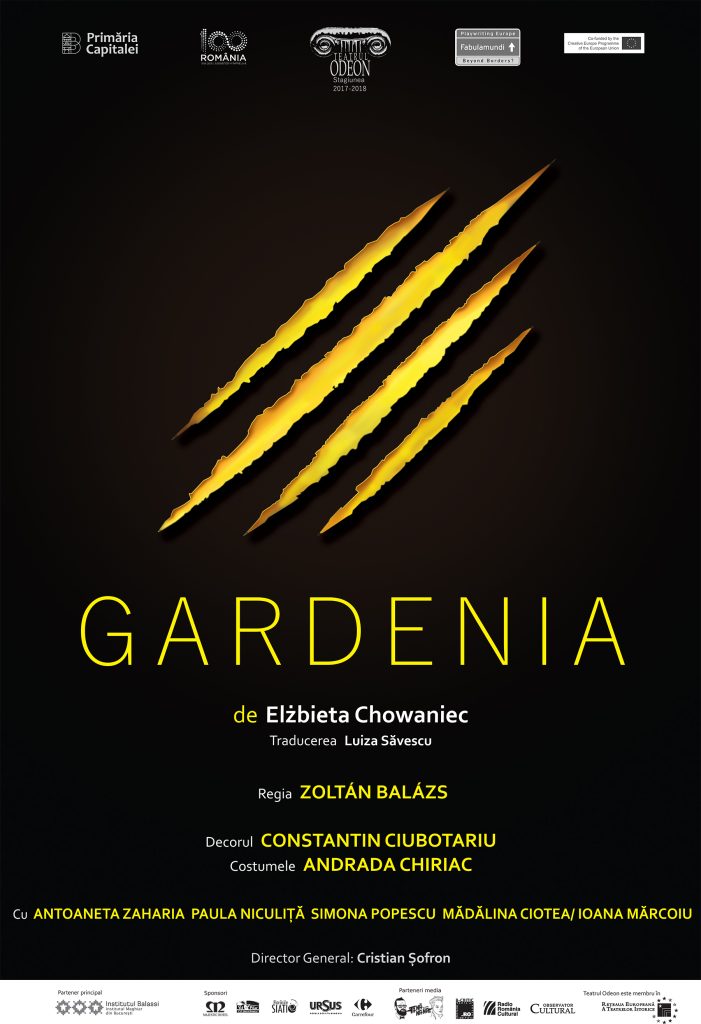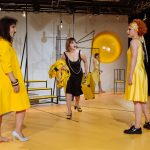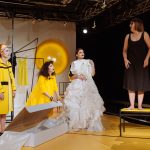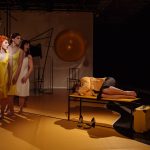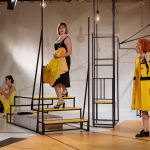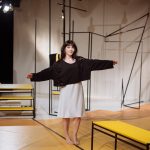By Elżbieta Chowaniec, Directed by Zoltán Balázs (Hungary)
Gardenia is produced within the European project Fabulamundi. Playwriting Europe, co- funded by the European Commission within the program Creative Europe 2017-2020.
Woman I – Antoaneta Zaharia
Woman II – Paula Niculiță
Woman III – Simona Popescu
Woman IV – Mădălina Ciotea / Ioana Mărcoiu
By Elżbieta Chowaniec
Translated by Luiza Săvescu
Directed by Zoltán Balázs (Hungary)
Stage design Constantin Ciubotariu
Costumes Andrada Chiriac
International Theatre Festival Sibiu, 20 June 2019
Theatre Festival Elvira Godeanu, Tg Jiu, 9 May 2019
Journées Théåtrales de Carthage, Tunis, 15 December 2018
Theatre Festival Toma Caragiu, Ploiesti, 10 November 2018
National Theatre Festival, Bucharest, 25, 27 October 2018
FEST(in) on the Boulevard, Bucharest, 14 October 2018
Short Theatre Festival, Oradea, 25 September 2018
Best Show Award at Theatre Festival “Elvira Godeanu”, Tg. Jiu 2019
Constantin Ciubotariu – Best Set Design Award, FEST (in) on the Boulevard Festival, Bucharest, 2018
Zoltan Balazs – Best Director Award, Short Theatre Festival, Oradea, 2018
Constantin Ciubotariu, Andrada Chiriac – Best Scenography Award, Short Theatre Festival, Oradea, 2018
Gardenia tells the story of four generations of Polish women from the same family who are fighting with their schemas, convictions and heritage. All the women present their story at the same age – great grandmother, grandmother, mother and daughter – thirty three years old and get through historic circumstances starting with the second world war till the present time. These circumstances shape partly women’s life but what influence them directly, they would say, is their mother. To what extent does this happen, we let you discover yourself, in a show where the director’s vision blends the theatre with the opera arias.
Together with the actresses Antoaneta Zaharia and Paula Niculiţă, who have been part of the theatre team for over 15 years, you will discover for the first time on our stage the new employed actresses Simona Popescu and Madalina Ciotea.
Photos by Vlad Catană
Elżbieta Chowaniec was born in 1982 in Kraków. She is a playwright and dramatist, author of plays for adults and children. She is a graduate of Katowice Film School with a degree in Film & TV Production, Łódź Film School with a diploma in Screenwriting, and Warsaw University with a Journalism degree. She attended the School of Drama at the Drama Laboratory in Warsaw. She has participated in numerous playwriting seminars and workshops with authors like Mark Ravenhill, Nikolaj Kolada, Iwan Wyrypajew. She is a recipient of the Theater Scholar Award from the Ministry of Culture and National Heritage.
Gardenia is her first work, and was staged in 2007 at the Drama Laboratory, Warsaw. Since then it has been translated into numerous languages and staged in Hungary, Slovakia, Russia and Romania. Since her debut in 2007, her plays and their adaptations have premiered over 20 times.
Zoltán Balázs graduated as an actor and director from the University of Theatre and Film Arts in Budapest. He participated in several foreign workshops such as in Anatoly Vasiliev’s and Josef Nadj’s workshop in Avignon. He studied with Robert Wilson in Paris and he also graduated the European Theatre Union’s directorial course in Stuttgart. In 2001 he founded one of the most important independent theatre, Maladype Theatre, and since he has been the artistic director in Budapest, Hungary. Zoltán Balázs is a regular guest at festivals and theatres around the globe – not just with his own company but as a director, too. He directed in the United States, France, Germany, Slovenia, Slovakia and Romania as well. His many-sided and versatile artistic work and his performances experimenting with new theatrical language have been honoured with many theatre and state awards. Through his performances he aims to give the audience a theatrical experience which is complex, appeals to emotions and senses and raises the scenery, motion and music to the same level as the lyrics.
Gardenia is produced within the European project Fabulamundi. Playwriting Europe, third edition, funded by the European Commission within the program Creative Europe 2017-2020.
Main Partner Hungarian Institute.
“Fabulamundi Playwriting Europe: Beyond Borders?” is a cooperation project among theatres, festivals and cultural organisations from 10 EU Countries (Italy, France, Germany, Spain, Romania, Austria, Belgium, UK, Poland and Czech Republic). The network aims to support and promote the contemporary playwriting across Europe, in order to reinforce and enhance the activities and strategies of the professionals and artists working in the sector and to provide the theatre authors and professionals with opportunities of networking, multicultural encounter and professional development.
In the frame of this project, at Odeon Theatre has been presented between 2012 – 2016 eight reading performances from the dramaturgy of all the partner countries. The translated play were published in 2015 and 2016 in the volumes Italian contemporary drama and European contemporary drama, at Cheiron Publishing House and Cultural Foundation „Camil Petrescu”.
Kepler-438b was the first performance produced within this project.
Reviews
Those prodigal mothers and their daughters
Razvana Nita, 6.06. 2018, Acta est fabula
Is it something genetic? Or is about the mentality that, over the course of a century, does not change fundamentally? A certain kind of implacable, a touch of destiny, beyond our power to manage our own life? Or the irresistible desire to be part of the future of our children? To be – so – contemporary to our posterity?
The text is very well written, it is glacial, without ornaments, which gives it the cool beauty of a diamond. And here comes the extraordinary sense of the director Zoltán Balázs, who knew how to maintain the hardness and clarity of the text through movements and phrases denuded by sentimental ornaments. The show becomes an ex-position, with the thought of a therapy session, during which unfolds the events, almost surgically, to reveal better the universally valid texture symbolized by the gardenia mentioned in the fourth sequence. The inner world becomes verb, but a translucent and objective verb, which allows you to see more clearly inside.
The key of director reading is perfectly supported by Constantin Ciubotariu’s set and Andrada Chiriac’s costumes, reflecting the same schematism of mother-daughter-mother-daughter relationships. The geometry of the stage movement and replicas, as well as the essentialization of affective relationships, finds a perfect correspondence in the geometry of space and set, as well as that of costumes.
b-critic.ro | Claudiu Sfirschi-Lăudat | 30 June 2018
I congratulate the director Zoltán Balázs for how he managed to build from fine details an entire history of the trauma of the four women, which eventually becomes a single-trauma-with-four-characters. Two colors, yellow and black, the former being dominant, because, not so, the traumatic black had to be erased as soon as possible, except that … the director played intelligently on the scenographic card, so that somewhere in the scenic sequence the yellow becomes the color trauma and black reflects the superiority of the survivor. (…)
I had rarely the occasion to hear so many famous or less-known opera arias in a theatre show. And I find brilliant the combination between the music of the great opera composers and the subject of the show. (…)
A very good show that does not leave you indifferent, which brings into atention four very good actresses excellently highlighted by a director who has assumed till the end the idea to break the trauma in slices: just by understanding you can go further and only so can avoid the restoration of the mistakes of the past.
Bookhub/ Nona Rapotan/ 20 January 2019


